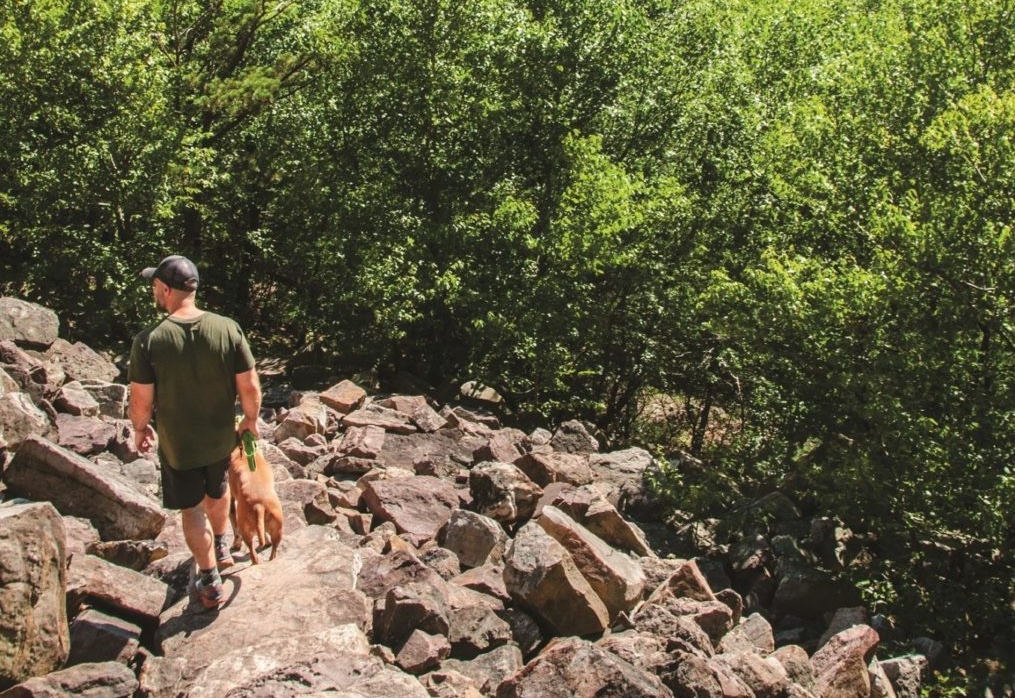This story originally appeared in The Centre County Gazette.
PHILIPSBURG — Over the course of 21 years, Josh Helke has built his company, Organic Climbing, into an internationally renowned manufacturer of outdoor gear. However, in just a few weeks, the company’s sales have declined so much that Helke has had to make the difficult decision to lay off two of his 30 employees — a result of recent announcements of tariffs and growing “anti-American” sentiment in countries that have been solid trade partners in the past, he said.
The solar-powered sewing factory, located in Philipsburg’s Moshannon Valley Regional Business Park, makes everything from backpacks and crash pads to apparel and even dog beds and is well-regarded around the world for the high quality and sustainability of their products.
According to Helke, international sales make up over 40% of the company’s business, so as Canadian and European distributors alike begin boycotting American-made products in response to tariffs and foreign policy shifts, a small company like Organic Climbing says it feels the effects deeply.
Helke said he saw hints of pushback from his international customers during President Donald Trump’s first term when distributors in other countries requested that Organic Climbing stop using American flags in their “Made in the USA” labels. This time, pushback has reached surprising new levels, he said.
“Our international customers acknowledge that our product is higher quality and that they would prefer to purchase from us … To see them choose economic protest over what their true ethos is, this is a pretty radical change for most of our customers. It’s pretty striking,” he said.
On the other end of the supply chain, planned tariffs on imported goods mean that the company will be paying a lot more for the specialized heavy-duty fabric that Organic Climbing uses for its products. This crucial piece is made from recycled plastic bottles through a complex process that is only available in South Korea.
“I would love to purchase it domestically, but we have no other option; we simply don’t have the infrastructure in this country to make the recycled fabrics that I use,” he said.
In addition, he said, the tariffs cause uncertainty because “You don’t even know what the costs on your goods are because honestly some of these tariffs go up in a day. You might order a container full of fabric or webbing and all of a sudden, the price changes when it lands,” Helke continued.
Helke said he is not opposed to tariffs in theory, especially on finished products that are in direct competition with American goods, but he feels that the way they are being implemented is “shortsighted” and “chaotic.”
He would like to see the federal government enact a formal process to allow manufacturers to file for an exemption from tariffs on imported parts when there is no domestic alternative, for example — similar to the exemption process Pennsylvania used during the early days of COVID which allowed Organic Climbing to remain open to produce surgical masks.
Helke said he would like to see the government provide financial incentives to American manufacturers to develop technologies that reduce the dependence on imported materials.
“Unless we really rally behind the whole ‘Made in the USA’ thing and offer grants and support to encourage innovation, tariffs aren’t going to do anything to increase domestic manufacturing,” he said.
As things stand, “I am being punished for making stuff in the U.S. I could make it cheaper outside of the country … We’re just a micro-example of what the rest of our country faces,” he continued. “We’ve all been doing our best to recover since COVID, and to get hit with this, I think a lot of people are just going to give up.”
For his part, Helke is determined to stick it out, in part out of obligation to the valued employees in whom the company has invested a great deal of training.
“Our goal right now is to keep breaking even and keep paying people,” he said. “This just doesn’t seem sustainable for anyone; it can’t last forever. If we can just remain standing, we’ll come out on the other side.”



